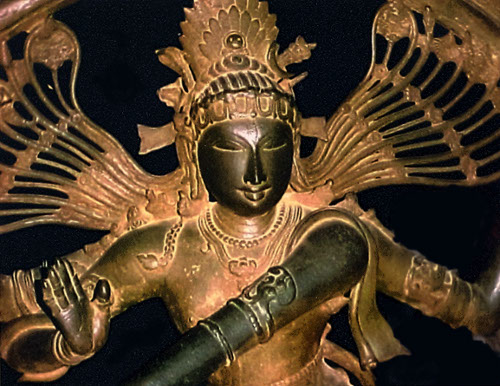I was recently going through a series of articles being put on the website of Sringeri Mutt (www.sringeri.net) under a section called Upadesha Lahari. It contains translations, audio, video of lectures of current and former Jagadgurus of Sringeri Mutt. The articles published there are really good and meant for common men who are interested in spiritual elevation.
Here I summarize one of those articles which is a translation of Anuraga Bhashanam (lecture on devotion) delivered by Jagadguru Shankaracharya Sri Bharati Tirtha Mahaswamiji at Kapaleeshwara Temple in Chennai during his Vijaya Yatra in 1986
To worship God (Bhagavan) and thereby become the recipient of His Grace is what has been traditionally regarded for thousands of years as an ideal to aspired for. It is our responsibility to keep up that tradition.
यस्याहुरागमविद: परिपूर्णशक्ते-
रंशे कियत्यपि निविष्टममुं प्रपञ्चम् ।
तस्मै तमालरुचिभासुरकन्धराय
नारायणीसहचराय नम: शिवाय ॥
Sri Shankara has conveyed much about how Iswara should be worshiped. Normally, when we visit a temple, we do not go empty-handed; we take some offerings with us for Ishwara. What is the most fitting offering to Bhagavan? The reply given by Sri Sankara in the form of a prayer to Ishwara is quite interesting.
“O, Lord, what shall I offer You? What competence do I possess for offering anything to You? What is the object not possessed by You which I can give You?”
Offering gold, gift of money, modern articles, cool sandal wood paste etc to God is not appropriate. Bhagavatpada analyzed all these options and came to a conclusion.
“O, Lord, I am not competent to offer anything to You. However, there is an object, which I am going to dedicate to You. It is my mind.”
Many raise the objection, “It is not possible to offer the mind to Ishwara. If the mind were to be an external object, we could take it and place it at His feet. But it is not so. We cannot physically handle the mind. How then can we dedicate our minds to Ishwara?” The answer is, “By keeping Ishwara in our minds at all times”. The import is that a person must ever engage himself in thinking of Ishwara. He should not entertain any other thought in his mind.
Is it possible to achieve such a mental state?
In Lord Krishna’s time, the Gopis were ever contemplating on Him. We read in the Bhagavata that the minds of the Gopis did not think of anything or anyone, but the Lord. A devotee has composed a beautiful verse about the condition of the Gopis.
विक्रेतुकामा किल गोपबाला मुरारिपादार्पितचित्तवृत्ति: ।
दध्यादिकं मोहवशादवोचद्गोविन्द दामोदरमाधवेति ॥
The Gopis earned their living by selling milk and curds. In order to attract the attention of people to the items the Gopis had to loudly utter, “Milk! Curds!”. Instead, the Gopis shouted, “O, Govinda! O, Damodara! O, Madhava!” and so on. They set out to sell milk and curds but as their minds were ever engaged in the thought of the Lord, the words “milk” and “curds” did not come out of their mouth. They were uttering the names of the Lord.
God will accept whatever one offers to Him if one’s mind is ever engaged in thinking of Him.
Bhagavan has declared in the Gita:
पत्रं पुष्पं फलं तोयं यो मे भक्त्या प्रयच्छति ।
तदहं भक्त्युपहृतमश्रामि प्रयतात्मन: ॥
“I will accept whatever one offers Me with true devotion.”
Though it is only the knowledge of the Self which leads to liberation, a person who is not competent to tread the path of knowledge should worship Ishwara with devotion. What, indeed, will be the fate of a person who lacks the competence and the opportunity to directly get the knowledge of the Self and yet does not tread the path of devotion?
सा त्वस्मिन्परमप्रेमरूपा ॥
So say the Sastras. One must direct one’s attention exclusively to the Lord; such a state of mind is termed as devotion.
Devotion is not a path meant only for common folk. It is not as if the wealthy ones need not be devoted. All are equal from the standpoint of Ishwara. It will be a grave sin if one were to think that one need not bow down to Ishwara just because one is affluent.
Please read the complete translation of the Bhashanam at the following link
